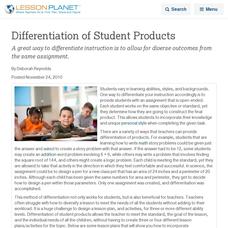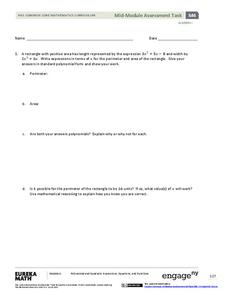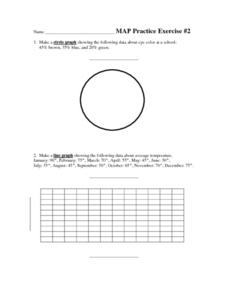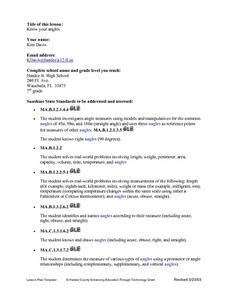Curated OER
Fences and Posts
Fifth graders use Geoboards to demonstrate how shapes can be made by looping the rubber bands over the nails. They make a triangle on their Geoboards. At least one side of the triangle should be either horizontal or vertical. The picture...
Pennsylvania Department of Education
Making Cubes
Third graders explore vocabulary associated with three dimensional figures. In this transformations lesson, 3rd graders create two dimensional nets for three dimensional figures. Students become familiar with describing two...
Curated OER
Differentiation of Student Products
A great way to differentiate instruction is to allow for diverse outcomes from the same assignment.
Curated OER
Tiling Tessellations
Students explore tessellations. In this shapes and geometry lesson, students describe the attributes of many of the shapes displayed on an Elmo. Students create examples of tessellations using pattern blocks.
Curated OER
Cylinder: Student Worksheet
Pairs of geometry whizzes work together to determine which of three differently shaped cylinders will have the greatest volume. Pupils cut out the three rectangles embedded in the plan, and tape them together to form a cylinder. From...
EngageNY
Mid-Module Assessment Task - Algebra 1 (module 4)
Performance task questions are the most difficult to write. Use this assessment so you don't have to! These questions assess factoring quadratics, modeling with quadratics, and key features of quadratic graphs. All questions require...
Creative Educator
Dream Room Design
Junior designers brainstorm the elements that a bedroom might have, such as a bed, television, and dresser. They identify which items are needs and which are desires. They practice measurement skills in the classroom by determining its...
Curated OER
Pythagorean Theorem by Graphic Manipulation
There are many different ways to show a proof of the Pythagorean Theorem. Here is a nice hands-on paper cutting activity that shows a graphic representation. You can even challenge your young Pythagoreans to come up with their own...
Alabama Learning Exchange
What You Know About the Bermuda Triangle?
Get lost in the classifications. Using the backdrop of the Bermuda Triangle, pupils classify it by angle and side measures. They also learn information about the triangle and its history.
Curated OER
Real-life Problems, Working with Fractions #2
Decimals and fractions can be tricky - especially in word problems! Help your fourth and fifth graders solve these word problems, all of which involve real-life application and decimals or fractions. There are separate spaces for writing...
Curated OER
MAP Practice
In this geometry worksheet, students create circle, line and bar graphs using different comparisons of events. There are 24 questions with an answer key.
Exploratorium
Beyond Dominoes: Polyominoes
Dominoes, polyominoes, tetrominoes, and pentominoes are the subject of this interesting math activity designed for middle schoolers. Pupils cut out shapes that are embedded in a worksheet in the plan, and experiment with them by...
Utah Education Network (UEN)
Real World Equations and Inequalities
Use of the resource = Opportunities for increased learning. Learners must use equations and inequalities to solve real-world and geometric problems.
Curated OER
Relative Age Dating
Modeling dough and paper cutouts in science class? Learn about how relative age dating concepts, like the Law of Superposition and cross-cutting relationships, can be used to describe the formation of sedimentary layers.
Curated OER
Design a Colonial Garden
Students explore botany by completing an art design activity in class. In this gardening history lesson, students identify the plants and crops utilized in the Colonial era for both food and medicine. Students utilize geometry to create...
Alabama Learning Exchange
The Water Cycle
Learners identify the stages of the water cycle. They listen to the book "Magic School Bus: Wet All Over," examine the Build Your Own Water Cycle website, predict and measure the amount of water in a jar for a week, and read a short play...
Curated OER
Measurement: 2D and 3D
Students solve volume problems. In this geometry lesson, the class watches a video about clean water (link provided) and individuals compare the volume of different prisms, including an actual drinking glass. Extension activities include...
EngageNY
Mid-Module Assessment Task: Grade 7 Mathematics Module 3
Lesson 16 in the series of 28 is a mid-module assessment. Learners simplify expressions, write and solve equations, and write and solve inequalities. Most questions begin as word problems adding a critical thinking component to the...
Flipped Math
Unit 9 Review: Factoring
Make it complete. Pupils work through 16 problems to review factoring. The problems consist of straight factoring of polynomial expressions, solving equations by factoring, and applying factoring to real-world problems.
Curated OER
Poly-Mania
This hands-on instructional activity takes young geometers on a tour of 2D polygons and 3D polyhedrons. After exploring different web resources and discussing geometric shapes, small groups construct models of polyhedrons using bendable...
Curated OER
Know Your Angles
Explore types of angles and the characteristics of each. After observing a PowerPoint Presentation, learners tour the school facilities and use a digital camera to capture prescribed angles. Using the digital pictures and written...
Curated OER
Matchstick Math: Using Manipulatives to Model Linear, Quadratic, and Exponential Functions
Playing with matches (unlit, of course) becomes an engaging learning experience in this fun instructional unit. Teach pupils how to apply properties of exponential functions to solve problems. They differentiate between quadratic and...
Curated OER
Real-life Problems, Money, and Weight
Solve five word problems involving money and weight. After studying the example at the top, which demonstrates how to write out the equation in a word problem, fourth graders work on adding large numbers in money and measurement. Here is...
Curated OER
My dream bedroom
In this dream bedroom worksheet, students fill in the grid to make a floor plan for their dream bedroom. Students follow 4 sets of directions for filling in the grid.

























